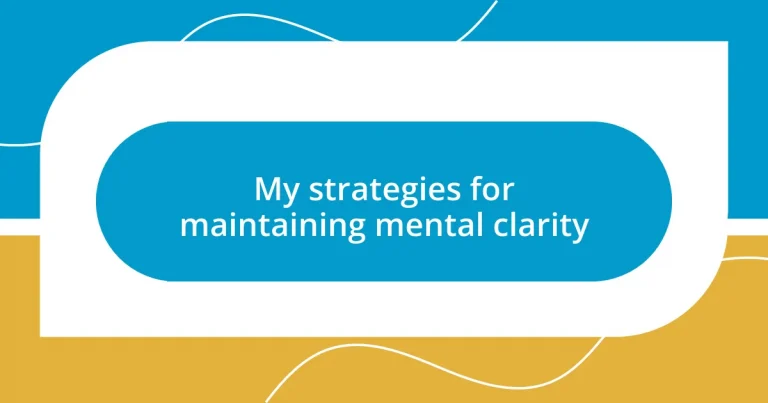Key takeaways:
- Mental clarity is essential for effective decision-making and overall well-being, helping to prioritize tasks and foster creativity.
- Establishing a consistent daily routine, incorporating mindfulness practices, and managing time effectively can significantly enhance mental clarity.
- Regular self-evaluation and reflection on progress help identify obstacles and foster growth, turning setbacks into opportunities.
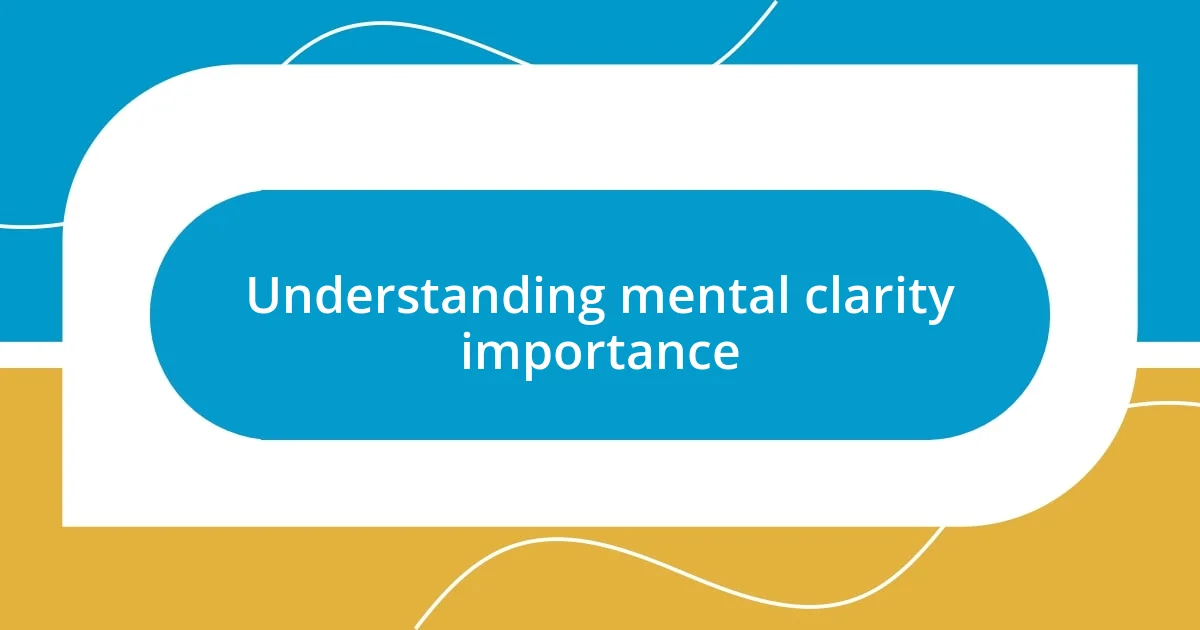
Understanding mental clarity importance
Mental clarity is crucial for navigating life’s complexities. I remember a particularly chaotic period when I felt overwhelmed with work and personal responsibilities. It was during this time that I realized how difficult it was to focus, make decisions, or even enjoy simple moments. Without mental clarity, we can find ourselves lost in distractions, unable to fully engage with the present or our goals.
Have you ever tried to think clearly but found your mind racing with a thousand thoughts? That’s a familiar feeling for many of us. When our mental space is cluttered, it’s like trying to tune into a radio station with poor reception—you can hear bits and pieces but miss the full message. I learned this the hard way when I noticed that my productivity plummeted during those foggy days; clarity, I discovered, is not just a luxury but a necessity for effective decision-making and overall well-being.
In moments of clarity, I’ve found that I can set priorities, tackle challenges head-on, and connect deeply with others. It’s transformative. The ability to think clearly opens the door to creativity and innovation, allowing us to explore new ideas without the noise of doubt and confusion. Wouldn’t it be wonderful to experience that state more often? Balancing the demands of life often depends on honing our mental clarity, which, in turn, can lead to greater fulfillment and success.
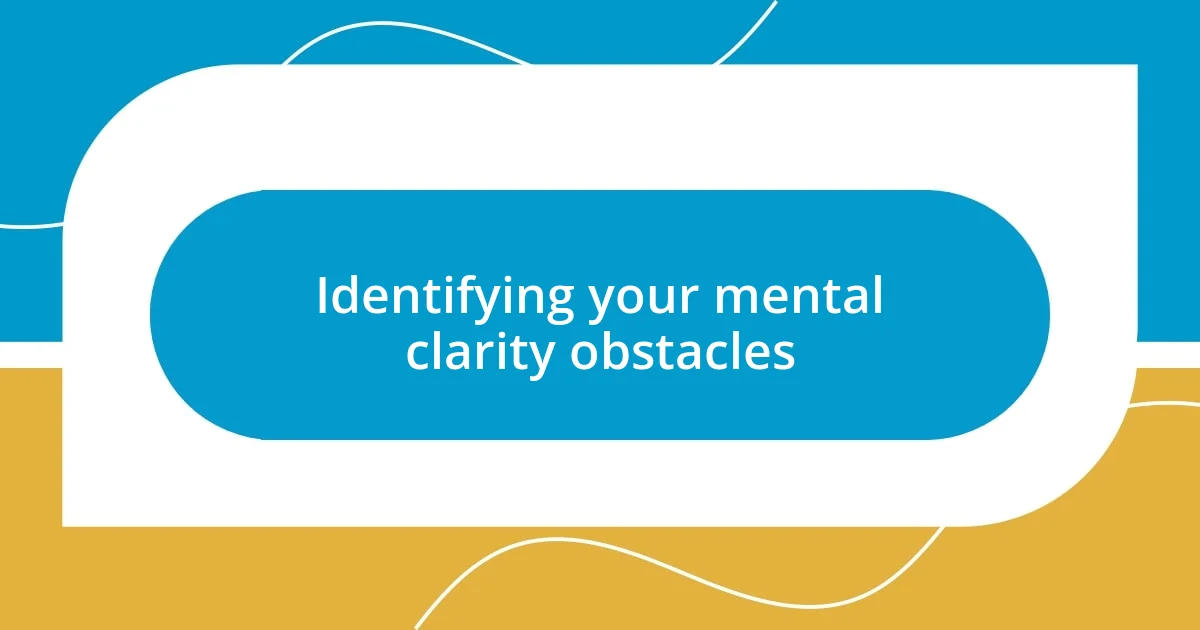
Identifying your mental clarity obstacles
Identifying the obstacles to mental clarity can be a revealing process. In my experience, I’ve found that the first step is to take a quiet moment and reflect on the factors causing distraction. Sometimes, it’s surprising to realize how often external noise or unresolved internal conflicts cloud our thoughts. When I faced tight deadlines but was also dealing with personal issues, I quickly recognized how my mind was split, making it hard to prioritize.
Here are some common obstacles that may undermine your mental clarity:
- Emotional baggage: Past experiences or unresolved feelings can weigh down your thoughts.
- Environmental distractions: Noisy spaces, cluttered workspaces, or demanding relationships can pull your focus away.
- Overcommitment: Taking on too many responsibilities leaves little room for reflective thinking.
- Digital overload: Endless notifications and the barrage of information from our devices can disrupt our mental peace.
- Physical health: Lack of exercise, poor diet, or insufficient sleep can severely affect cognitive function.
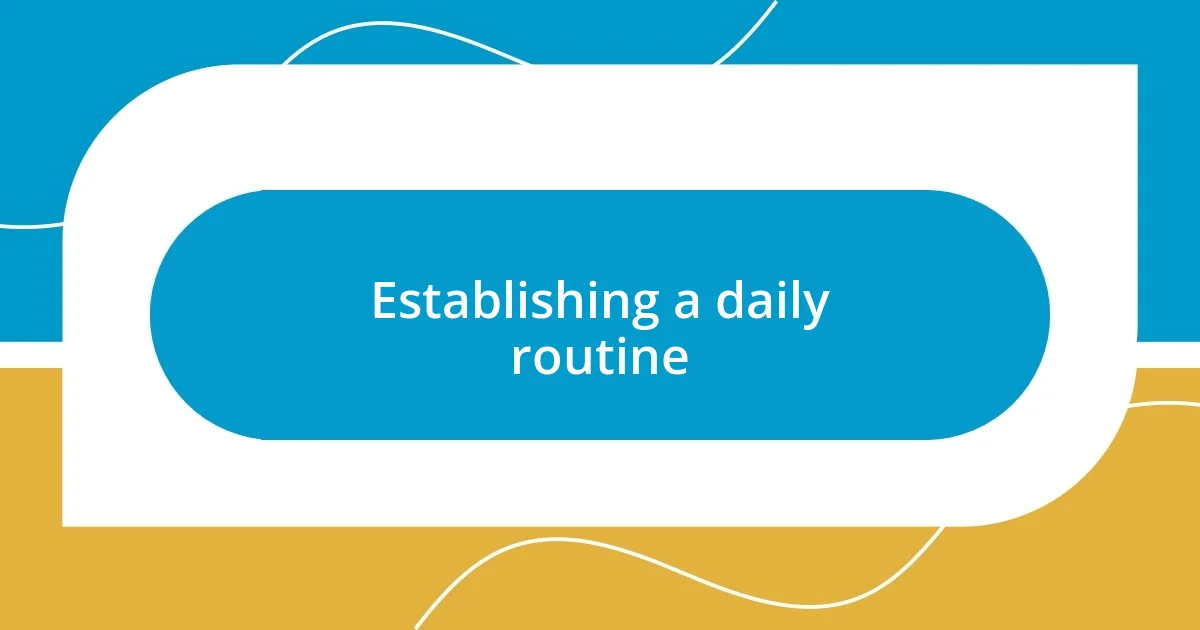
Establishing a daily routine
Establishing a daily routine has been a game changer for me in maintaining mental clarity. I find that a well-structured day provides a predictable framework that eases the chaos. When I wake up at the same time each day and follow a set sequence of activities—morning coffee, a quick workout, and some journaling—I notice a significant boost in my focus. This consistency doesn’t just ground my mind; it also sets the tone for a productive day.
Sometimes, I experiment with my routine to see what works best. For instance, I’ve switched up my morning rituals to include meditation instead of social media, and the impact has been profound. Instead of diving into a sea of notifications and distractions first thing, I now start my day with calmness. This slight shift in my routine has allowed me to approach my tasks with a clearer mind, making decision-making and creative thinking so much smoother. Have you given thought to how your daily activities are shaping your mental clarity?
One essential aspect of a daily routine is the importance of breaks. I’ve learned to incorporate short pauses throughout my day to recharge my mind. Whether it’s a five-minute stretch, a walk outside, or just stepping away from my workspace, these breaks help me return with renewed focus. Establishing a balance between productivity and rest is crucial for sustaining mental clarity long term.
| Routine Element | Impact on Mental Clarity |
|---|---|
| Consistent Wake-Up Time | Helps regulate your body clock, leading to better sleep and focus |
| Meditation | Promotes mindfulness, reducing anxiety and increasing the ability to concentrate |
| Regular Breaks | Prevents burnout and promotes fresh perspectives on problems |
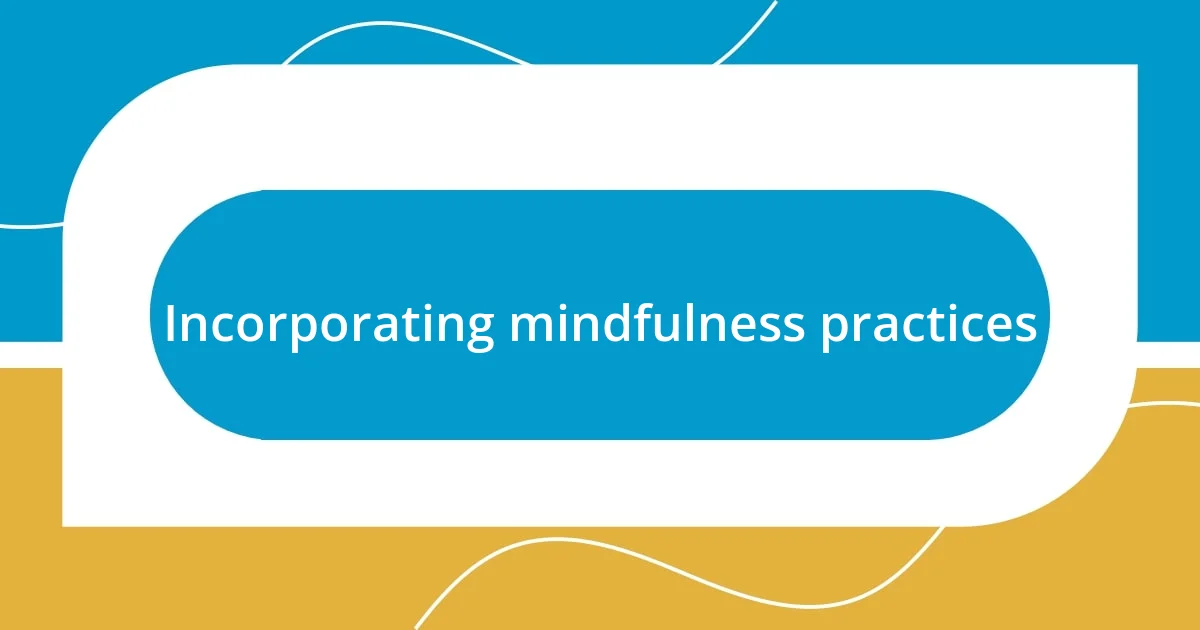
Incorporating mindfulness practices
Mindfulness practices have proven to be invaluable tools in my journey towards mental clarity. When I first tried mindful breathing, I was amazed at how just a few deep breaths could center my thoughts amidst chaos. It’s fascinating how a simple technique can redirect my focus, making daily challenges feel more manageable. Have you ever noticed how your breath changes when you’re stressed? Mine becomes shallow, often leading me to a spiral of racing thoughts. When I consciously take a moment to breathe deeply, I can feel my mind begin to settle.
I also prioritize mindfulness meditation as a part of my routine. Initially, I struggled with sitting in silence; my mind raced with to-do lists and worries. However, committing to just five minutes a day transformed my perspective. It became less about clearing my mind and more about observing my thoughts without judgment. This shift helped me cultivate a sense of awareness that spills over into my everyday life. How would it feel to simply acknowledge your thoughts instead of wrestling with them? For me, it’s freeing.
Incorporating mindfulness into my daily activities has also been a game changer. I’m intentional about my mornings, choosing to drink my coffee mindfully instead of scrolling through my phone. Savoring that first sip allows me to focus on the present moment. You’d be surprised how something as simple as enjoying your coffee mindfully can set a positive tone for the day. It’s those little changes that, over time, have led to significant enhancements in my mental clarity—and I genuinely feel more connected to each moment. Have you tried integrating mindfulness into your daily rituals? It’s a practice worth exploring!
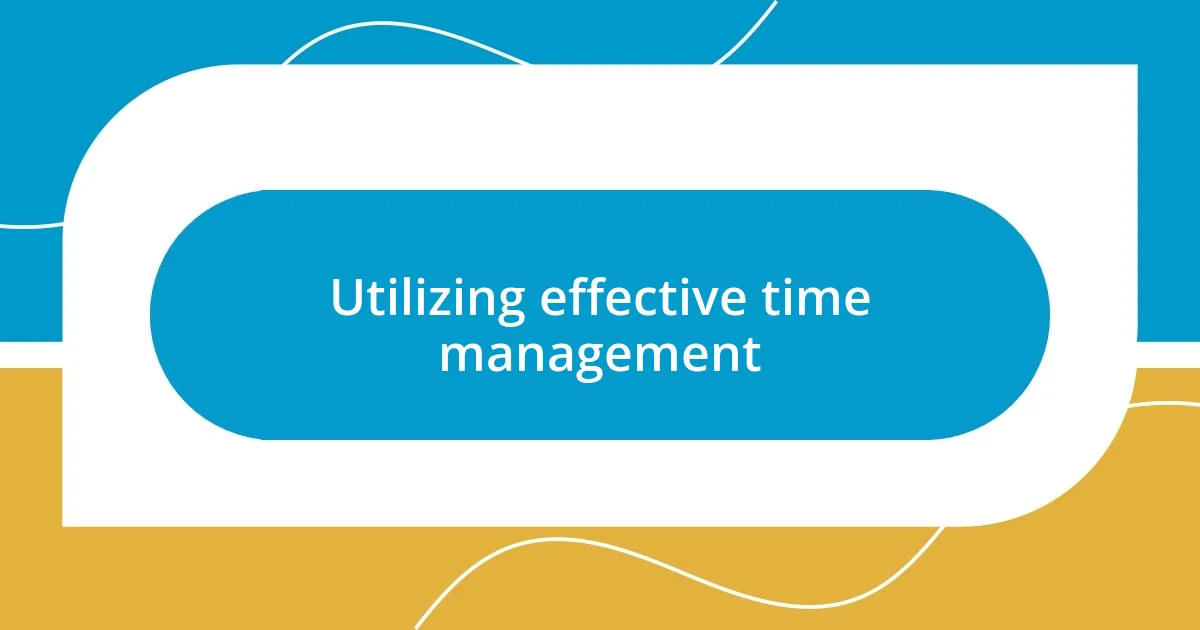
Utilizing effective time management
Managing time effectively has been transformative for my mental clarity. When I began using a simple planner, I noticed an immediate change in how I approach each day. It may sound basic, but jotting down tasks helps me visualize what I need to accomplish, reducing the mental clutter that often leaves me feeling overwhelmed. Have you ever felt that sense of chaos when you don’t know where to start? I certainly have, and this straightforward method has been a beacon of organization amid the storm.
One strategy that I’ve found helpful is breaking my day into focused blocks. For instance, I set aside specific hours for deep work on projects and allocate separate slots for meetings and calls. This not only minimizes distractions but also allows me to immerse myself fully in each task. There’s a certain joy in knowing that for that hour, I’m entirely dedicated to one thing. Have you tried time blocking? If not, I encourage you to experiment with it; the mental clarity it can bring is genuinely rewarding.
Moreover, I’ve learned the significance of saying “no.” It might feel uncomfortable at first, especially if you’re a people-pleaser like I used to be. However, this practice has been liberating. By declining additional commitments that don’t align with my priorities, I’ve created more space to focus on what truly matters. Have you considered how many unnecessary tasks pile up in your schedule? Embracing the power of “no” has allowed me to reclaim my time, leading to a much clearer state of mind and improved productivity.
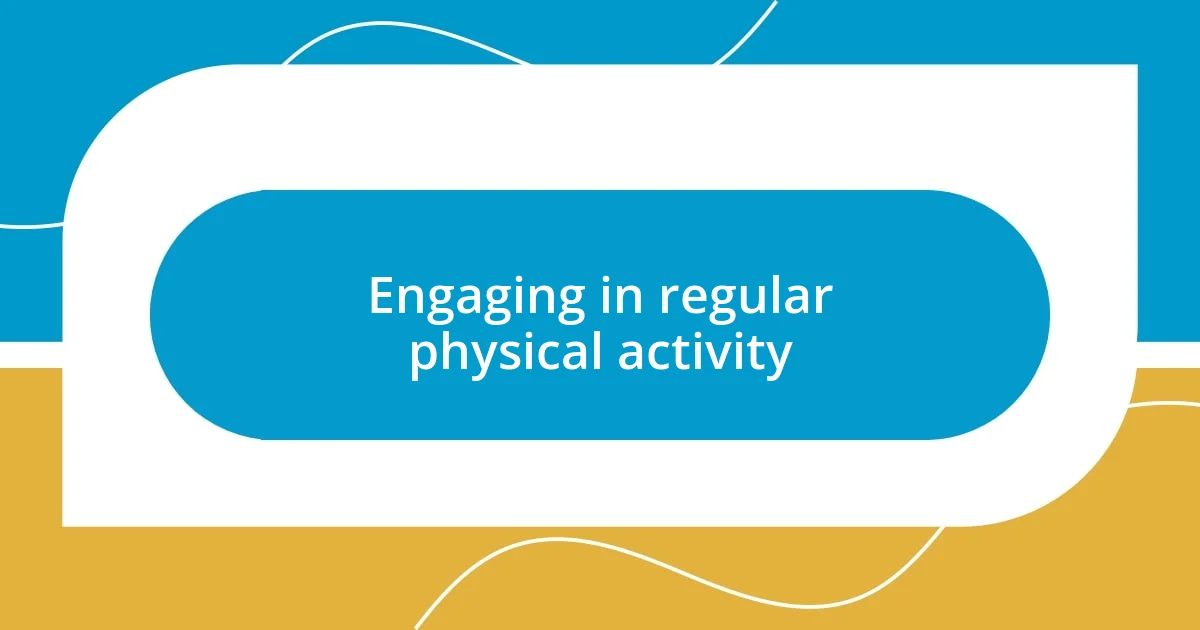
Engaging in regular physical activity
Engaging in regular physical activity has been a cornerstone of my mental clarity. I vividly recall the time I decided to join a local running club. At first, I was hesitant—I had never considered myself a runner. But once I started, I realized that running not only boosted my endorphins but also provided a mental reset I never knew I needed. It’s incredible how hitting the pavement can clear my head and create a sense of focus that lingers long after my workout.
On days when I’m feeling particularly foggy, a brisk walk does wonders. I can almost feel the tension evaporating with every step I take. I once had a challenging day at work, and instead of succumbing to stress, I stepped outside for a short walk. Within minutes, my thoughts aligned, and I returned feeling refreshed, ready to tackle my tasks with renewed energy. Have you ever tried stepping away from your desk for a moment? You might be surprised at how much clarity a little movement can bring.
Incorporating diverse activities into my routine has also played a role. I often mix yoga, cycling, and weight training to keep things interesting. Each offers unique benefits; yoga enhances my flexibility and calming focus, while cycling invigorates me and gets my heart racing. Reflecting on this variety, I see how each workout contributes to my overall mental state. Are you exploring different forms of physical activity? Finding what you love can make a profound difference in how you feel, both physically and mentally.
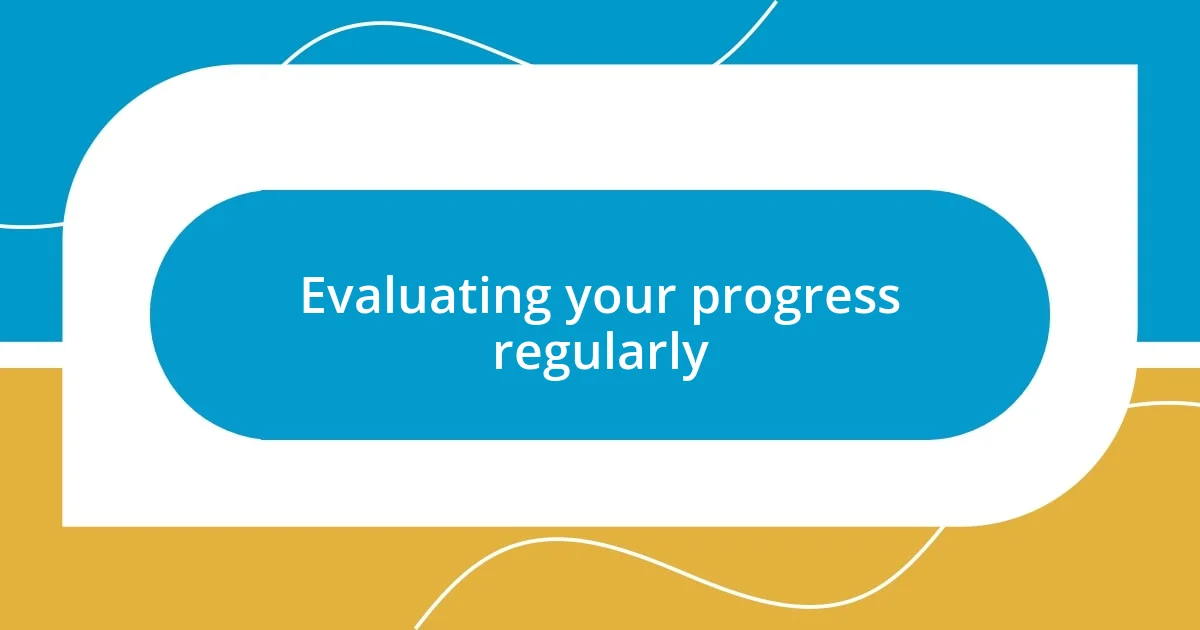
Evaluating your progress regularly
Regularly evaluating my progress has become an essential practice in maintaining my mental clarity. Each week, I sit down with my journal to reflect on what I’ve accomplished and what challenges I’ve faced. It’s surprising how much clarity comes from simply acknowledging my successes and failures—it’s like shedding a light on the foggy areas of my mind. Have you ever paused to truly assess what you’ve done? You’ll likely discover insights you hadn’t recognized before.
I’ve found that setting specific, measurable goals makes this evaluation more effective. For example, I aimed to enhance my focus by reducing distractions while working. At the end of the week, I review how often I stayed on task and what activities derailed my efforts. This targeted reflection not only highlights areas for improvement but also boosts my motivation. It’s like having a personal coach cheering me on while also guiding me to do better. Have you considered tracking your progress in a similar way? It can be eye-opening.
The emotional aspect of these evaluations can be transformative. Instead of seeing setbacks as failures, I’ve learned to view them as opportunities for growth. I vividly remember a week where I slipped back into old habits of procrastination. Rather than berating myself, I assessed the underlying causes and made a plan to address them. That shift in perspective didn’t just boost my mental clarity—it sparked a renewed sense of resilience. Can you relate to that feeling of bouncing back stronger? I believe regular self-evaluation fosters not just clarity, but also a more compassionate relationship with ourselves.












